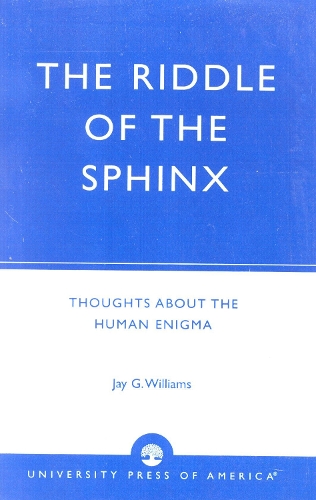
The Riddle of the Sphinx: Thoughts About the Human Enigma
(Paperback)
Publishing Details
The Riddle of the Sphinx: Thoughts About the Human Enigma
By (Author) Jay G. Williams
University Press of America
University Press of America
20th September 1990
United States
Classifications
General
Non Fiction
Philosophy: metaphysics and ontology
128
Physical Properties
Paperback
228
Width 138mm, Height 217mm, Spine 18mm
313g
Description
Through a series of 144 short texts on 12 key subjects, this text introduces the reader to some of the central perplexities of human life. Along with those texts written by the author himself are selections from the sources - Genesis and Lao Tzu, Plato and the Upanishads, Hume and Wittgenstein, Augustine and Ecclesiastes, to name a few. Topics range from the nature of language, to pleasure and pain, to life after death. Most of the classical questions of the philosophy of religion are introduced. Because selections from both the East and West are included, the Riddle of the Sphinx can serve as an introduction to comparative philosophy and/or religion.
Reviews
...a colourful platter of savoury hors d'oeuvres. The author's own writings are combined with carefully selected texts...and they invite the reader to explore the human enigma. -- Nikky Singh, Colby College
This is, as one would expect from Jay Williams, a book as profound as it is unusual. It does not merely tell the reader about the metaphorical nature of religious language; it forces him or her to experience it, to be caught in verbal mazes from whichthere is no way out save by recognizing that, like carriages turning into pumpkins and horses into mice, words can turn into other things: wordless experiences, black holes and escape hatches. Read it (if you dare) and you won't think about words or religion in quite the same way again. -- Robert Ellwood, University of Southern California
This is, as one would expect from Jay Williams, a book as profound as it is unusual. It does not merely tell the reader about the metaphorical nature of religious language; it forces him or her to experience it, to be caught in verbal mazes from which there is no way out save by recognizing that, like carriages turning into pumpkins and horses into mice, words can turn into other things: wordless experiences, black holes and escape hatches. Read it (if you dare) and you won't think about words or religion in quite the same way again. -- Robert Ellwood, University of Southern California
...a colourful platter of savoury hors d'oeuvres. The author's own writings are combined with carefully selected texts...and they invite the reader to explore the human enigma. -- Nikky Singh, Colby College
Author Bio
Jay G. Williams is Walcott-Bartlett Professor of Religion at Hamilton College, Clinton, New York.
